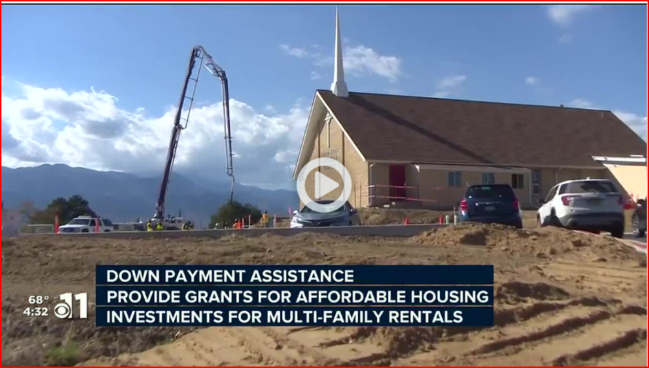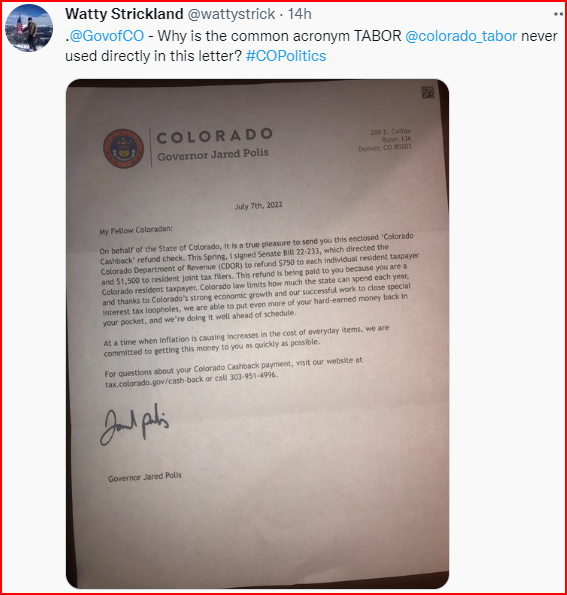
#DontBeFooled
#ItsYourMoneyNotTheirs
#VoteOnTaxesAndFees
#FeesAreTaxes
#TABOR
#ThankGodForTABOR
#FollowTheMoney
#FollowTheLaw

#DontBeFooled
#ItsYourMoneyNotTheirs
#VoteOnTaxesAndFees
#FeesAreTaxes
#TABOR
#ThankGodForTABOR
#FollowTheMoney
#FollowTheLaw
#DontBeFooled
#ItsYourMoneyNotTheirs
#VoteOnTaxesAndFees
#FeesAreTaxes
#TABOR
#ThankGodForTABOR
#FollowTheMoney
#FollowTheLaw

Ben Murrey
Thanks to the Taxpayer’s Bill of Rights, commonly known as “TABOR,” Coloradans will receive nearly $4 billion in excess revenue refunded from the state this year. That’s where those $750 checks for individuals and $1,500 for couples came from over the summer. On the ballot this year, Proposition 123 is asking voters to give up their refunds, at least in part.
If adopted by voters, the measure would reduce TABOR refunds by about $86 per person, based on information from the state voter booklet or “Blue Book.”
The measure dedicates up to 0.1% of income tax revenue to affordable housing programs administered by state bureaucracies. For years in which the state has a TABOR surplus, that would reduce TABOR refunds by about $300 million. State economists currently project refunds for at least the next three years.
Even Democrats — who rarely refuse the opportunity to spend more of your money on new government programs — have been skeptical of the measure.
Democratic state Sen. Chris Hansen, of Denver, expressed concern that Proposition 123 could eat directly into the state’s ability to spend on other priorities.
“There’s no free lunch,” Hansen said referencing the measure. “K-12 and higher education (is) where the marginal dollar is in our state budget. So $1 less means $1 less for education.”
The statement proves a bit disingenuous, but the senator is right to say there is no such thing as a free lunch. Continue reading

11 News spoke with supporters and opponents of CO Proposition 123 Thursday about their goals and worries.
Published: Oct. 6, 2022 at 8:36 PM EDT
COLORADO SPRINGS, Colo. (KKTV) -Supporters of Colorado Proposition 123 met in Colorado Springs Thursday morning to discuss their hopes and goals for the ballot item, which will appear statewide on Election Day.
If passed, Proposition 123 would dedicate 0.1% of the state budget to help fund affordable housing programs.
That comes out to almost $300 million, and that money would be going to programs designed to create rental units with a cap of 30% of a renter’s income, provide down payment assistance for qualifying individuals, and give grants to local governments for affordable housing development, among other things. Click here to visit Colorado’s “Blue Book” guide with an in-depth look at Proposition 123 on page 30.
Supporters said the proposition will allow people in lower-paying crucial careers, like education and nursing, to be able to afford to live in the communities they work in. Continue reading
FYI. This was on Twitter yesterday:

BoulderGuyTC@BoulderGuyTC
Replying to @wattystrick @GovofCO and @colorado_tabor
One great, though lesser-known benefit provided in the Colorado Taxpayer’s Bill of Rights (TABOR) is the local ballot issue notice. This guide is sent by mail at least 30-days before the election to all households with one or more registered voters.
The ballot issue notice includes content and details about upcoming local ballot measures that increase taxes, add debt, or suspend TABOR revenue limits. It includes a section where registered voters have the opportunity to submit FOR or AGAINST comments, up to 500 words each.
You should know that there are two types of TABOR ballot issue notices. One notice is for the statewide elections and commonly referred to as the “Blue Book.” The notice discussed here is for elections held by local governments such as a city, town, school district, or special taxing district. You could potentially get more than one of these notices in the mail.
Several years back, it was discovered that out that of some 300 local tax issues throughout the state during a ballot year, only 15 had the taxpayer’s voice printed in a ballot issue notice. That’s only 5 percent! You can make a big difference and amplify your voice by being an author of the next ballot issue notice where you live. Considering that you reach thousands of voters, being able to submit comments in the TABOR notice costs almost nothing and takes relatively little time and energy.
What follows is an explanation of how to participate in the local ballot issue FOR or AGAINST comment process. As in so much of government bureaucracy, instructions must be followed with no room for alteration. The deadline for this year is Friday, September 23 no later than noon to have your comments included in the local TABOR notice.
To continue reading this story at Complete Colorado, please click (HERE):

#DontBeFooled
#ItsYourMoneyNotTheirs
#ThankGodForTABOR
#VoteOnTaxesAndFees
#FeesAreTaxes
#TABOR
#FollowTheMoney
#FollowTheLaw
September 8, 2022 By Sherrie Peif
LAKEWOOD — A Colorado State Senate candidate has added her name to a long list of Democrats trying to take credit for this year’s Taxpayer’s Bill of Rights (TABOR) refunds, despite a history of trying to eliminate the constitutionally required return of overcollected tax revenue.
Lisa Cutter, who until this year has represented House District 25 and served as the House Majority Caucus Co-Chair, is featured in a social media ad telling voters she was responsible for the refund checks that recently went out to Coloradans, that are actually the result of TABOR, an amendment to the Colorado Constitution that limits the state from raising taxes or exceeding a revenue limit on a portion of the state budget without first asking voters. The ad, which links back to Cutter’s campaign website, makes no mention of TABOR, instead claiming she “Delivered Colorado’s biggest tax relief checks ever.” Continue reading
A small housing complex in Lyons. (Moe Clark/Colorado Newsline)
Colorado voters will decide this November whether to boost state spending on affordable-housing initiatives by tapping into funds that could otherwise be returned under the Taxpayer’s Bill of Rights.
Initiative 108, which officially qualified for the 2022 ballot last month, would dedicate an additional $300 million annually to the state’s affordable housing efforts. It would protect the additional revenue by exempting the funds from the annual limits set by TABOR, the 1992 constitutional amendment that places restrictions on Colorado’s taxation and spending levels.
“This measure is desperately needed if we want future generations of Coloradans to thrive,” Brian Rossbert, the executive director of the nonprofit Housing Colorado, part of a coalition supporting the measure, said in a statement.
“Too many Coloradans can no longer afford to live in the neighborhoods where they set down roots,” he said. “That’s forcing families to make difficult relocation decisions, robbing communities of essential services and intensifying our homelessness crisis.”
If approved by voters, Initiative 108 would establish a new State Affordable Housing Fund and exempt it from TABOR limits. Each year, 60% of its funding would support a housing program overseen by the state’s Office of Economic Development and International Trade, with the remaining 40% distributed by the Department of Local Affairs.
The measure requires the bulk of the OEDIT funding to be directed towards “equity investments in low- and middle-income multi-family rental developments.” Efforts overseen by DOLA would include grants to assist first-time homebuyers with their down payments and a separate program to provide rental assistance and housing vouchers to people experiencing homelessness.
A state issue committee in support of Initiative 108, Coloradans for Affordable Housing Now, raised $2.8 million to fund its campaign earlier this year. Its largest donor by far is Denver-based charitable organization Gary Community Ventures, which has contributed $2 million. Other donors include Habitat for Humanity Denver and the National Association of Realtors.
The measure has drawn opposition from Advance Colorado Action, a deep-pocketed, “dark money” nonprofit that has helped fund and coordinate a wide range of conservative causes in recent Colorado elections.
“There is nothing ‘affordable’ about taking $300 million of our TABOR tax refunds for a flawed housing measure,” Advance Colorado’s Michael Fields said in a statement last month. “To fix our state’s housing crisis, we need to build more, not tax more.”
Backers say the measure could help fund the construction of 170,000 new homes in the coming years, offsetting what is projected to be a worsening housing crunch in fast-growing Colorado.
In May, a fiscal impact statement by the nonpartisan Legislative Council Staff noted that the measure’s TABOR impact would vary from year to year depending on revenue levels and how lawmakers choose to distribute refunds.
“If refunds are paid via current law mechanisms, the measure is expected to reduce refunds by approximately $40 per taxpayer, on average, for tax year 2023 and $80 per taxpayer, on average, for tax year 2024,” analysts wrote.
“The measure will increase investments in affordable housing developments, boosting incomes for developers and construction firms,” nonpartisan staff wrote in a separate fiscal summary. “Some households that would otherwise face housing insecurity may find stable housing under the measure, increasing their financial security and opportunities for employment.”
Other measures up for a vote on Colorado’s 2022 ballot include three proposals to change the state’s liquor laws.
https://coloradonewsline.com/2022/09/07/affordable-housing-reduce-tabor-refunds-2022-ballot/
Affordable housing program will cut into your TABOR refunds
By Natalie Menten
Guest Commentary
The state government has taken more taxes from you than we allow it to have, and it should rebate that over-collection back to you. That money coming back to all taxpayers is now in jeopardy. We should be alarmed at the potential waste.
Colorado voters’ dissatisfaction with government growing beyond its means led to the passage of the Taxpayer’s Bill of Rights (TABOR). This constitutional amendment requires voter approval for tax increases and debt. It also limits how fast government can grow. The formula for automatic tax increases is the prior year’s budget plus adjustment for inflation and population growth.
When government collects taxes above the limit, it must refund the surplus. Later this year, each taxpayer will get a $750 TABOR rebate from the state. The economic outlook predicts rebates for the next several years.
Two statewide ballot measures in November claim they don’t raise taxes, but that’s just not true. Funding for new programs comes from our future TABOR rebates. If we don’t get all those rebates back, that’s effectively a higher tax rate and clearly a tax hike.
One measure proposes to divert TABOR rebates to subsidize affordable housing programs. Proponents have spent hefty money on paid signature gathering. They are meeting with local elected officials and lobbying for political buy-in. They gloat that they had raised $5 million by June 1 and that they plan to spend millions more to sway Colorado voters. How much of the campaign donations will come from developers who specialize in subsidized projects?
Our TABOR rebates would be diverted into a new “Affordable Housing Fund,” to be split 60/40 between state and local governments. The requirements to release the funds come with damaging, top-down controls. Local elected officials would have to guarantee increasing affordable housing by 3% each year over a baseline number, as well as implementing a 90-day fast-track permit approval process.
If a local jurisdiction won’t or can’t comply with the measure’s requirements, not only would we taxpayers not receive our TABOR rebates, but the local government would be disqualified from the subsidy.
How would dense metro areas increase subsidized housing units year after year? Would they build out, build up or replace?
At what point might local governments discourage and make it more difficult to build singlefamily homes? Examples abound, including Minneapolis, Oregon and California banning single-family developments. It seems far-fetched that Colorado would enact these restrictive policies, but that’s what we have to anticipate with passage of this ballot measure.
This measure encourages government to compete against Ma and Pa to buy property. Who has deeper pockets?
Seniors whose retirement depends on rental income might well be affected because this proposal creates an eviction defense fund, which would pay attorneys with taxpayer money to prevent landlords from evicting non-paying tenants who are at risk of becoming homeless.
There’s a long list of problems in this extreme initiative (currently No. 108). The paid circulators I’ve encountered know little to nothing about the Taxpayer’s Bill of Rights, so they aren’t informing signers that the money comes from our upcoming TABOR tax rebates.
Since backers are apparently willing to spend many, many millions of dollars to pump out TV ads and fill our mailboxes with slick marketing pieces, I don’t know where our opposition campaign will find similar amounts of money to counter the propaganda.
Citizens who sign the petition likely aren’t aware of the devious, negative results. Hopefully by the time the election rolls around in November, voters will understand this ballot issue’s dangers and vote no.